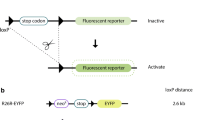Abstract.
We have investigated the effects of the expression of wild-type and mutant Brca1 alleles on the murine mammary gland morphogenesis and carcinogenesis. Primary cultures of mammary cells from BALB/cByJIco mice were infected with recombinant Babe Puro retroviruses expressing lacZ, full-length Brca1, splice variant Brca1-Δ11, or mutant Brca1-W1777Stop alleles. Infected cells were reinjected into the mammary fat pad of a syngeneic virgin mouse whose endogenous epithelium had previously been removed. Four months after reinjection, nulliparous and postlactating mice were checked for the reconstitution of the mammary gland. Stable expression of β-galactosidase was observed in the ducts formed by epithelial mammary cells infected with Babe Puro/lacZ retrovirus. Epithelial mammary cells transduced with full-length Brca1 developed normally, whereas those transduced with Brca1-Δ11 or Brca1-W1777Stop formed atypical duct hyperplasia associated with reduced branching. These results suggest that ectopically expressed splice variant Brca1-Δ11 and mutant Brca1-W1777Stop have dominant negative effects.
Similar content being viewed by others
Author information
Authors and Affiliations
Additional information
Electronic Publication
Rights and permissions
About this article
Cite this article
Bachelier, R., Vincent, A., Mathevet, P. et al. Retroviral transduction of splice variant Brca1-Δ11 or mutant Brca1-W1777Stop causes mouse epithelial mammary atypical duct hyperplasia. Virchows Arch 440, 261–266 (2002). https://doi.org/10.1007/s004280100500
Received:
Accepted:
Published:
Issue Date:
DOI: https://doi.org/10.1007/s004280100500




